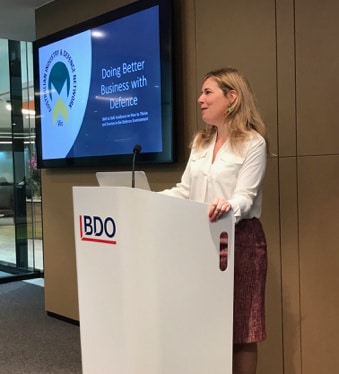Since March 2020, many companies have had to adjust to the idea of remote operations and while there are no standard processes for dealing with a worldwide pandemic, there are available strategies to minimise its impact on your organisation and maximise project delivery outcomes to your clients.
With COVID-19 forcing businesses to rapidly change their internal processes in a short amount of time, agility and dialed up collaboration have been key to ensuring that any organisation can continue to deliver, along with helping to maintain morale. This article explores successful remote project management strategies that we’ve adopted during the global crisis.
Business values and their correlation to project delivery
A business that enables their teams to make sound decisions in the absence of supervision will always be well-positioned to handle situations that require a level of autonomy. As Sarah Norton, Senior Consultant, Pre-contract Services and Tender Submissions notes, “at Systematiq we have strong communication tools and processes in place, so from a connection perspective, we are empowered in our roles when working remotely,”
“One of our values is reliability, and that comes back to managing your day to achieve business and client objectives effectively; you can mold your day rather than being constrained by office hours. We’re used to working flexibly and it’s definitely been enhanced during this time.”
All of this helps us to establish an understanding of our client’s needs. From the client’s point of view, we produce their desired outcome, which helps to reaffirm their trust in our business. As Chris Cyc, Associate – Service Delivery, explains, “Whether you’re in lockdown or a regular working situation, the key to remote consulting is a good level of engagement. Trust is something that’s built through regular communication and constant delivery of successful outcomes.”
The importance of future planning
Flexible work is evolving rapidly to the point that it is almost a norm. While it offers benefits like freedom for our employees – that stem from values of accountability, trust, and reliability – it also promotes communication as a fundamental tool. With flexible working as a standard procedure within in our workforce to deliver client outcomes, we are well equipped to manage communication protocols that provide a sense of normalcy for both teams and clients.
We constantly look for innovative solutions to our clients’ problems; utilising new technologies pre-COVID and adapting them to suit the new working conditions. Having this as standard practice makes it much easier to focus on proactive problem-solving.
“There’s been a lot of emphasis on implementing technology that enables flexible ways of working, but the key is understanding it’s not an out-of-box solution. It’s about changing the mindset,” says Nicole Snyder, Business Development Manager. “My advice is to keep reevaluating ways of working, for example, a Skype call might be best-suited one on one, and a teleconference better suited to large groups. Just because the technology is there, we need to find ways to adapt it to suit our operations.”

Our tips for delivering project services during COVID-19
Effective contract management and communication are often handled via an online platform, making it easy to keep “business as normal” during times where remote work is the only option.
- Ensure all communication and documentation is clear and unambiguous and refer to the relevant contract terms to avoid confusion about their contractual status.
- Keep records of all actions, decisions, project records and events to ensure everyone is on the same page regarding client communications.
- Keep messages short, clear, and factual. This gives clients confidence, knowing that their projects are being handled efficiently and competently.
- Take the opportunity to break up your day, use exercise to move away from the screen to help stay focused for during the times you are in front of it, delivering a higher level of service to clients.
- Be pro-active in client contact to ensure project timelines and milestones are hit.
Your communication platform is also vital to successful project delivery. “Body language is so important in communication and that is hard to gauge in virtual communication. So, we’ve adapted with collaborative tools, like Microsoft Teams,” states Darren Carr who manages the Training team for Learning Systems Analysis, “the video conferencing aspect has been an advantage for us.” He adds that his team has adapted quickly to Microsoft Teams environment, reinforcing that it was a well-selected and necessary option for the workforce.
Adapting and moving forward
COVID-19 is an extraordinary crisis, and all companies face challenges for their leadership and management teams. We all must change the way we work and assessing your preparedness, along with being transparent with employees and clients are the keys to adopting better work practices.
At Systematiq we pride ourselves on keeping your projects moving forward, in any circumstance. Contact us today to learn more about how we can apply our expertise in project management to provide best practice solutions for you in professional service delivery.




